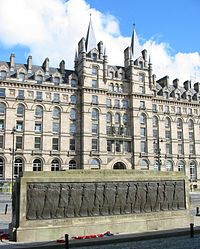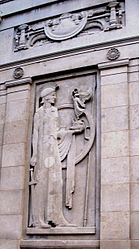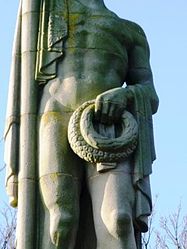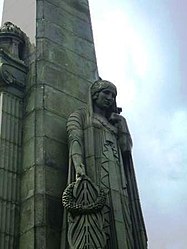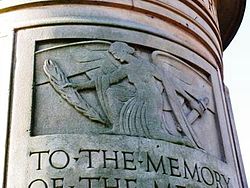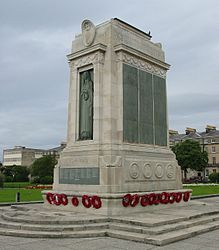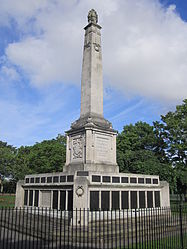Herbert Tyson Smith

George Herbert Tyson Smith (1883–1972) was an English sculptor born in Liverpool. He executed many works in the Liverpool and Merseyside area, in particular war memorials. He was the brother-in-law of fellow Liverpool sculptor Edward Carter Preston. Carter Preston designed the "Next of Kin Memorial Plaque"[1] He was the uncle of the potter Julia Carter Preston.
Tyson Smith's father was an engraver and lithographic printer. Tyson Smith attended Liverpool College of Art where he studied plaster and stone carving and clay modeling. He was taught drawing by Augustus John at the "Art Sheds". Tyson Smith was particularly interested in the early artistic works of Egypt and Greece.[2]
In the First World War, Tyson Smith served in the Royal Flying Corps.[2]
Tyson Smith set up his first studio in 1919 when he returned from war service and he moved into a larger studio at Bluecoat Studios in 1925.[2]
Works
War memorials
| Work | Location | Notes and References | |||
|---|---|---|---|---|---|
| The Liverpool Scottish War Memorial | Liverpool | This memorial now stands in St George's Hall in the centre of Liverpool. This bronze memorial commemorates the Liverpool Scottish, then the 10th (Scottish) Battalion of the King’s (Liverpool Regiment) and was unveiled on 9 June 1923 by General Lord Horne at the Drill Hall in Fraser Street, Liverpool. It contains an illuminated leather-bound book recording the names, all listed equally, of over 1,100 Territorial officers and men of the Liverpool Scottish who fell in the First World War. It was designed by Major Campbell of the Regiment and was sculpted by Herbert Tyson Smith.[3] | |||
| Accrington War Memorial | Accrington Lancashire | The War Memorial in Accrington was unveiled on 1 July 1922, the anniversary of the first day of the Battle of the Somme, and stands in Oak Hill Park, a public garden just outside Accrington off the Manchester Road. It consists of an obelisk on a massive pedestal with a wall behind. On the main face of the obelisk is a carved female figure. According to the notes written at the time of the unveiling, this female figure represents "Compassion" and "Piety". She holds a wreath and a palm. In front of the obelisk are twelve green Westmorland slate tablets with the names of the fallen (865 names in all). Behind this obelisk a wall bears the names of the 173 men who fell in the Second World War. On the front of the pedestal are the words and on the rear The wall is inscribed The unveiling was carried out by a local industrialist, Mr.H.H.Bolton, who had lost three sons in the war.[4][5][6] | |||
| Westminster Road Congregational Church War Memorial | Kirkdale Merseyside | For this church Tyson Smith carved a walnut memorial inscribed 26 names are listed for the 1914–1918 war and six for 1939–1945.[7] | |||
| The Parish Church of Christ Church War Memorial. | Bootle Merseyside | The men of the parish who laid down their lives in the 1914–1919 war are remembered on an elaborate white marble monument in the church which has depictions of a wreath and standard and a lion and the words "Pro Patria" carved on each side of the inscription. This inscription reads 112 names are listed.[8] | |||
| Bangor-Is-Y-Coed | Bangor-Is-Y-Coed Clwyd | The memorial stands in Bangor-Is-Y-Coed's High Street and features a female figure said to represent "Mourning". She stands in front of a semi-circular wall and the inscription reads 23 men of Bangor-Is-Y-Coed are remembered. The village also known as Bangor-on-Dee.[9][10] | |||
| The Parish Church of All Hallows War Memorial. | Allerton Merseyside | A stone table with pediment is positioned under the north transept and remembers the 27 men of the parish who gave their lives in the 1914–1919 war. It was designed by Tyson Smith.[11] | |||
| 22nd Cheshire Regiment Memorial | Chester Cheshire | In Chester Cathedral's Garden of Remembrance is a memorial to the 22nd Cheshire Regiment. The gates at the entrance to the garden carry an inscription in gold lettering and there are regimental crests carved on each face of the plinth and also on the stone gate posts, all the work of Tyson Smith. The inscription reads
| |||
| The Cheshire Yeomanry Tablet WW2 | Chester Cheshire | In Chester Cathedral itself there is a tablet which marks the service of The Cheshire Yeomanry in the Second World War. There are three stone tablets, and the central one is inscribed The left and righthand tablets have the names of those who died listed on them. 52 names are listed.[12] | |||
| Memorial to Wion de Malpas Egerton. | Chester Cheshire | Also in Chester Cathedral, and on the west wall of the south transept, we have a white marble memorial plaque which reads The rectangular white marble tablet has the above inscription in black lettering and also has the Royal Navy crest and the Egerton family crest (a Red Lion Rampant) to the left of the text. The wording in the third line is flanked by the flags of the Royal Navy.[13][14] | |||
| Liverpool Cenotaph | Liverpool Merseyside | This Cenotaph stands in front of St George's Hall on Lime Street, and Tyson Smith's reliefs arguably make this memorial one of the finest of the many such memorials in England. It was unveiled on 11 November 1930 and features on one side a relief representing those who mourn for the dead, and on the other side the servicemen marching off to fight. The inscription on the east face, which represents Liverpool on Armistice Day, reads "To the men of Liverpool who fell in the Great War, and the victory that day was turned into mourning unto all the people". In Tyson Smith’s relief the survivors, consumed with grief, file towards a central coffin and if we look carefully we see in the background to these figures, row upon row of gravestones; a depiction of a Great War cemetery. On the west face the relief depicts "The March to Action of the Fighting Services" and we see a representation of the relentless march to war of grim-faced servicemen, so many of whom were lost in the First World War. The words read "As unknown and yet well known; As dying, and behold we live/Out of the North Parts....A Great Company and a Mighty Army". The memorial was designed by Professor Lionel B.Budden and Morris Singer & Co were responsible for the bronze casting.[15] | |||
| The Parish Church of Arrochar- Memorial to Captain MacGunn. | Arrochar Strathclyde | Again Budden and Tyson Smith worked together to create a simple memorial which comprises the badge of The Cameron Highlanders and the inscription [16] | |||
| Birkenhead War Memorial | Birkenhead. Merseyside | This War Memorial is dedicated to the "Men of Birkenhead". The memorial stands in Hamilton Square and was unveiled on 5 July 1925. The memorial comprises a cenotaph with a moulded base, with frieze and name panels on the longer sides and reliefs at the short ends, all surmounted by a sarcophagus. Reliefs depict mourning female figures with a "Next of Kin Plaque" and laurel wreaths and a palm branch.
Below the name panels another relief has depictions of the emblems of the Army, Navy and the Merchant Navy. The civic arms of Birkenhead are embossed upon oval escutcheons. A staggering 1,455 names are listed for the First World War.[17][18] | |||
| Fleetwood War Memorial | Fleetwood. Lancashire | The Fleetwood War Memorial stands in Fleetwood's Memorial Park. On the top of a plinth stands a Romanesque figure with his right arm upraised and supporting a pole with the eternal flame at the top. In his left hand he holds a coiled snake and he has a laurel garland on his head. A photograph of the memorial from November 2008 is shown below. The plinth stands on a square base surmounted by an octagonal base. There are inscriptions on the sides of the plinth and on the base, and at the base four flower planters have the names added of men who fell in the 1939–1945 war. Around the top of the plinth is inscribed On one of the faces of the plinth is inscribed Around the base of the plinth the inscription reads On the lower base is written In the gallery below are more photographs from November 2008. 330 men of Fleetwood died in the First World War and 190 in the Second World War.[19] | |||
| West Lancashire Golf Club Memorial | Blundellsands. Merseyside | A slate tablet in the West Lancashire Golf Club at Blundellsands on Merseyside was erected on 18 October 1964 and remembers the members of the club who died in the two World Wars.[20] | |||
| St Mary and St Helen's Church War Memorial. | Neston. Cheshire | In St Mary and St Helens Church in Neston in Cheshire is another example of Tyson Smith’s prowess as a letter cutter, this time on a window in the church which remembers the men from the parish who died in the 1914–1918 war.[21] | |||
| Royal Academy of Arts | London | Tyson Smith executed a tablet at one end of the entrance porch to the Royal Academy of Arts which remembers the members and students of that Academy who fell in the First World War. The stone tablet has the initials "RA" surrounded by a wreath of laurel and oak leaves. This tablet was unveiled on 12 May 1922. A photograph of this tablet taken in August 2008 is shown below.[22] | |||
| St Matthew and St James' Church | Mossley Hill Merseyside | Another tablet carved by Tyson Smith can be seen in St Matthew and St James' Church at Mossley Hill on Merseyside. This remembers Lieutenant George Lawrence Harford who was killed at Ypres on 17 February 1915.[23] | |||
| Holy Trinity Church War Memorial | Wavertree. Merseyside | This church has a stone cross with flanking draped female figures on a pedestal. The cross remembers the men of Wavertree who died in the First and Second World War.[24] | |||
| Durham Cathedral War Memorial Cross. | Durham. County Durham | In Durham Cathedral is another stone cross, the cross of St Cuthbert, with ornate carvings on the sides of the shaft by Tyson Smith. It stands outside the Cathedral's East Front. Representations of various artefacts such as helmets and water bottles are carved onto the sides of the column. It was unveiled by the Marquis of Londonderry on 24 November 1928.[25] | |||
| Liverpool Medical Institute War Memorial. | Mount Pleasant Merseyside | There is a bronze plaque by Tyson Smith in the main entrance hall of the Liverpool Medical Institute on Mount Pleasant in Liverpool. One of the names on the plaque is that of Captain Noel Chavasse, VC and Bar, MC. The inscription reads On either side of the plaque is a relief depiction of the badge of the Medical Institute over an upended torch.[26] | |||
| Merchant Taylor's School War Memorial | Crosby. Merseyside | Professor Lionel B Budden designed this memorial and Tyson Smith carried out the sculptural work. It consists of a Westmoreland slate tablet and a brass plaque. The inscription reads The memorial is located in the school library and was unveiled on 2 October 1923. 155 names are listed.[27] | |||
| St Barnabas Church War Memorial | Mossley Hill. Merseyside | Slate tablets executed by Tyson Smith in St Barnabas Church, Mossley Hill on Merseyside remember the 43 men of the parish killed in the First World War.[28] | |||
| Hightown War Memorial | Hightown. Merseyside | The War Memorial at Hightown on Merseyside has a kneeling winged angel holding a wreath with some additional carvings on the memorial's cross.[29] | |||
| Southport War Memorial | Southport. Merseyside | The War Memorial at Southport stands in a memorial garden on Lord Street, at the junction with London Street. This most elaborate work was unveiled on 18 November 1923 by the 17th Earl of Derby. The memorial is on a grand scale, with a central obelisk and colonnades on either side. The obelisk is made of Portland Stone and is 21000mm (68.8 feet) high. On the side of each colonnade is a grassed area with pond. On the west face of the northern colonnade is a relief panel featuring Britannia seated with a trailing sword in her right hand and a small winged victory figure in her left hand, and on the west face of the southern colonnade there is a relief panel showing Britannia in mourning laying a wreath over a Greek helmet with a standard behind her inscribed "Patria". Photographs of these two reliefs are shown in the gallery below. Also shown in the gallery are the crossed wreaths and torches featured above the inscription on the east face of the northern and southern colonnades. The wording on the south face of the northern colonnade reads:That on the north face of the southern colonnade reads On the south face of the southern colonnade is carved . On the north face of the northern colonnade is carved In the four chapels various battles are marked. That on the north west carries the inscription "THEIR NAME LIVETH" and lists Messines Ridge, Paschendaele, Neuve Chapelle, Loos, Festubert and Ypres. The chapel on the north east carries the inscription "ALL THAT THEY HAD THEY GAVE" and lists Aisne, Somme, Marne, Foret de Morvel, Mons, and Arras. The chapel on the south east states "FOR THE SACRED CAUSE OF JUSTICE" and lists Cambrai, Le Cateau, R.Selle/Hindenbug Line, Salonika and Vimy Ridge and finally, the chapel on the south west declares "ON THE DECK OF FAME THEY DIED" and lists Falkland (sic),Palestine, Zeebrugge, Jutland, Mesopotamia and Gallipoli. On the east face of the southern colonnade an inscription reads On the east face of the northern colonnade an inscription reads On the obelisk itself is carved
|
Widnes War Memorial | Widnes Cheshire | Widnes War Memorial comprises a tall square column on a colonnaded plinth and broad oblong base bearing name panels, surmounted by an urn and flame in stone. A carved cross and wreath are on the end face of the column. The arms of Widnes appear on the pedestal. 818 Widnes men died in the First World War and 256 in the Second World War.[30] |
| Liverpool Post Office War Memorial | The Post Office War Memorial, another of Tyson Smith’s works, is a memorial to those men of the Liverpool Post Office who died in the First World War. It was originally unveiled in the main hall of the General Post Office in Victoria Street on 15 June 1924, but the memorial now stands in a new shopping precinct, the Met Quarter which was built on the old Post Office site. Tyson Smith carved a woman who symbolised Britain mourning her dead. The inscription reads Lascelles Abercrombie was a poet, and is the author of the verses quoted. 156 Post Office workers gave their lives in the Great War.[31] | ||||
| The Merchant Navy War Memorial | Liverpool | This memorial is situated at the Pier Head and was designed by Tyson Smith and built by Stanley Harold Smith and Charles Frederick Blythin. It was unveiled on 12 November 1952 by Admiral Cunningham. It bears the inscription The names of the fallen are inscribed on 25 bronze plaques on a semi-circular Portland Stone base.[32] |
Other work
| Work | Location | Notes and References |
|---|---|---|
| Stanley Hall | Liverpool | For the outside of this building in Edmond Street, Liverpool, Tyson Smith carved a plaque of a young man feeding a calf.[33] |
| St Monica's Church | Bootle Merseyside | For the outside wall of this church, Tyson Smith carved "The Three Angels".[34] |
| Former Lloyds Bank Building | Liverpool | For the former Lloyds Bank building in Williamson Street,Liverpool, Tyson Smith created a roundel showing a lady carrying coins in her scarf.[35] |
| Norris Green Library | Liverpool | On the outside of this library are some plaques carved by Tyson Smith.[36] |
| The Hod Carrier and the Architect | Liverpool | These works are now on display in the Museum of Liverpool.[37] |
| Spinney House. Church Street | Liverpool | Tyson Smith carved dolphins, starfish, seahorses, octopuses, lobsters, scallop shells, mermen, tridents and compasses on the outside of Spinney House. This building was originally built for the store Littlewood. It was it seems the last major building in Liverpool to incorporate decorative sculpture.[38] |
| Bluecoat Chambers | Liverpool | Bluecoat Chambers was originally built as a charity school in 1717 and is the oldest surviving building in central Liverpool. The Bluecoat School remained in this building until 1906 when it was relocated to Wavertree. In 1909 the building was purchased by the first Lord Leverhulme with the intention of using it as a centre for the Arts. This project never matured in Lord Leverhulme’s lifetime and in 1925 the building was purchased by the Bluecoat Society of Arts. However the building was badly damaged by German bombs in 1941 and required repair and restoration. There is a memorial stone to this repair work in the wall of the northern wing as you enter the gates (on the right hand side). Herbert Tyson Smith had a yard at the rear of the building and the memorial was his work. The plaque, in Latin, shows Tyson Smith’s letter-cutting skills and translates as . All the original main windows had keystone cherub's heads and six of them were replaced by Tyson Smith, as was the pediment over the main door. On either side of the plaque, there are reliefs of a schoolboy and schoolgirl, also carved by Tyson Smith. |
| Crown Public House | Liverpool | For the exterior of this public house on Stopgate Lane and the East Lancashire Road, Tyson Smith carved a dolphin and a woman pouring a drink.[39] |
| The Head of Athena | Liverpool | Tyson Smith created this sculpture on the Athenaeum Club building in Church Alley. Liverpool. |
| Barclays Bank Water Street | Liverpool | Tyson Smith was responsible for the bronze panels on the Barclays Bank building in Water Street, Liverpool.[40] |
| Bronze bust of George V | Birkenhead Merseyside | Tyson Smith created the bronze bust of George V in Birkenhead Library |
| Bronze busts of George V and Queen Mary | Birkenhead Merseyside | These busts at the Kingsway tunnel Birkenhead entrances are by Tyson Smith. |
| Memorial Plaque for William Garmon-Jones | Liverpool | For the Cohen Library, Liverpool University. Tyson Smith carried out the lettering on a memorial plaque for William Garmon-Jones. This includes a profile of Garmon-Jones. This is a fine example of Tyson Smith's skills as a letter cutter. Garmon-Jones had been in charge of the library for several years.[41] |
| The John Sampson Memorial Plaque | Liverpool | Also for the Cohen Library, Tyson Smith carried out the letter cutting on a memorial plaque to another Cohen Library librarian. |
| Liverpool Architectural Society Medal | Tyson Smith designed a medal for the Liverpool Architectural Society.[43] | |
| English Martyrs' Church | Wallasey, Merseyside | Tyson Smith designed the font, and a statue in the Lady Chapel of the Virgin Mary with St John Fisher.[44] |
Gallery of images
- Sculpture on Birkenhead War Memorial. Image courtesy Liz Taylor of Hixon, Staffordshire.
- North Western Hotel Liverpool with the Cenotaph in front.
- Cenotaph Liverpool, Herbert Tyson Smith. Marching column
- Cenotaph Liverpool, Herbert Tyson Smith. Sailors marching forward.
- Southport War Memorial – The Colonnade
- Southport War Memorial
- Southport War Memorial – Fountains
- Part of relief on Liverpool Cenotaph. Mourners gather round a coffin.
- Relief on Southport War Memorial.
- Relief on Southport War Memorial.
- Part of relief on Liverpool Cenotaph. Some of the mourners.
- Fleetwood War Memorial.
- Tyson Smith work on Fleetwood War Memorial.
- Tyson Smith work on Fleetwood War Memorial.
- Main sculpture on Accrington War Memorial
- Sculptural work by Tyson Smith on Fleetwood War Memorial
- Part Accrington War Memorial
- Accrington War Memorial. Image by Alexander P.Kapp.
- Cheshire Regiment Memorial.Image by John S Turner.
- Birkenhead War Memorial. Image by Man vyi.
- Widnes War Memorial. Image by Rept0n1x
- Plaque outside Royal Academy
- Detail from a decorative metal panel Martins Building. Image shown courtesy Reg Towner RIBA.
- Carving of Octopus. Martins Building. Image shown courtesy Reg Towner RIBA.
- Neptune. Carving on Martins Building. Image shown courtesy Reg Towner RIBA.
- Bust of James Darcy Lever in Lady Lever Art Gallery/ Image shown courtesy Brian A Browne
Membership of Societies
- Associate member of Royal Society of British Sculptors from 6 December 1927 – 1945. Became a fellow in 1945.[45]
- Fellow of Royal Society of British Sculptors. 8 March 1945 – 1972[46]
His grave
Tyson Smith is buried in Allerton Cemetery in Liverpool.[47]
References
- ^ Inspired by an epitaph, written by Edmund Garrett who was inspired by the famous epitaph of Simonides at Thermopylae.
- ^ "The Next of Kin Memorial Plaque" The Great War 1914–1918. Retrieved 21 October 2012
- ^ a b c Artist Biography: George Herbert Tyson Smith. Archived 10 June 2011 at the Wayback Machine Norwich: University of East Anglia. Retrieved 11 August 2012.
- ^ The Liverpool Scottish War Memorial Archived 24 June 2014 at the Wayback Machine The Liverpool Scottish. Retrieved 21 October 2012
- ^ Accrington War Memorial UKNIWM. Retrieved 20 October 2012
- ^ Accrington War Memorial British Cemeteries Memorials. Retrieved 21 October 2012.
- ^ Accrington War Memorial Liverpool Monuments. Website with excellent photograph of main sculpture on Accrington War Memorial. Retrieved 21 October 2012
- ^ Westminster Road Congregational Church War Memorial UKNIWM. Retrieved 20 October 2012
- ^ The Parish Church of Christ Church War Memorial UKNIUWM. Retrieved 20 October 2012
- ^ Bangor-Is-Y-Coed UKNIWM. Retrieved 20 October 2012
- ^ Bangor War Memorial Bangor-on-Dee Website. Retrieved 21 October 2012
- ^ The Parish Church of All Hallows War Memorial UKNIWM. Retrieved 20 October 2012
- ^ The Cheshire Yeomanry Tablet WW2 UKNIWM. Retrieved 20 October 2012
- ^ Memorial to Wion de Malpas Egerton UKNIWM. Retrieved 20 October 2012
- ^ de Malpas Egerton Website of St Peter's Church in Little Budworth Cheshire with photograph of de Malpas Egerton memorial.Retrieved 21 October 2012
- ^ Liverpool Cenotaph UKNIWM. Retrieved 20 October 2012
- ^ The Parish Church of Arrochar- Memorial Captain MacGunn UKNIWM. Retrieved 20 October 2012
- ^ Birkenhead War Memorial UKNIWM. Retrieved 20 October 2012
- ^ Birkenhead War Memorial Public Monuments and Sculpture Association. Retrieved 21 October 2012
- ^ Fleetwood War Memorial UKNIWM. Retrieved 20 October 2012
- ^ West Lancashire Golf Club Memorial UKNIWM. Retrieved 20 October 2012
- ^ St Mary and St Helen's Church War Memorial UKNIWM. Retrieved 20 October 2012
- ^ Royal Academy of Arts War Memorial UKNIWM. Retrieved 20 October 2012
- ^ Harford Memorial UKNIWM. Retrieved 20 October 2012
- ^ Holy Trinity Church War Memorial UKNIWM. Retrieved 20 October 2012
- ^ Durham Cathedral War Memorial Cross UKNIWM Retrieved 20 October 2012
- ^ Liverpool Medical Institute UKNIWM. Retrieved 20 October 2012
- ^ Merchant Taylor's School War Memorial UKNIWM. Retrieved 20 October 2012
- ^ St Barnabas Church War Memorial UKNIWM. Retrieved 20 October 2012
- ^ Hightown War Memorial UKNIWM. Retrieved 20 October 2012
- ^ Widnes War Memorial UKNIWM. Retrieved 20 October 2012
- ^ Liverpool Post Office War Memorial UKNIWM. Retrieved 20 October 2012
- ^ The Merchant Navy War Memorial Archived 27 June 2012 at the Wayback Machine Liverpool World Heritage. Retrieved 21 October 2012
- ^ Stanley Hall plaque Liverpool Monuments. Retrieved 21 October 2012
- ^ St Monica's Church Liverpool Monuments. Retrieved 21 October 2012
- ^ Lloyds Bank Roundel Liverpool Monuments. Retrieved 21 October 2012.
- ^ Norris Green Library Liverpool Monuments. Retrieved 21 October 2012
- ^ The Hod Carrier Liverpool Monuments. Retrieved 21 October 2012
- ^ Spinney House Archived 14 September 2012 at the Wayback Machine The Liverpolitan. Retrieved 21 October 2012
- ^ Crown Public House Liverpool Monuments. Retrieved 21 October 2012
- ^ Barclays Bank Water Street British Listed Buildings. Retrieved 21 October 2012
- ^ Garmon-Jones Liverpool Monuments. Retrieved 21 October 2012
- ^ John Sampson Memorial Liverpool Monuments. Retrieved 21 October 2012
- ^ LAS medal Liverpool Monuments. Retrieved 21 October 2012
- ^ Historic England. "Roman Catholic Church of English Martyrs (1390589)". National Heritage List for England. Retrieved 27 September 2013.
- ^ Society Memberships Mapping the Practice and Profession of Sculpture in Britain and Ireland 1851–1951. Retrieved 20 October 2012
- ^ Society Memberships Mapping the Practice and Profession of Sculpture in Britain and Ireland 1851–1951. Retrieved 20 October 2012
- ^ Tyson Smith Grave Liverpool Monuments. Retrieved 21 October 2012


